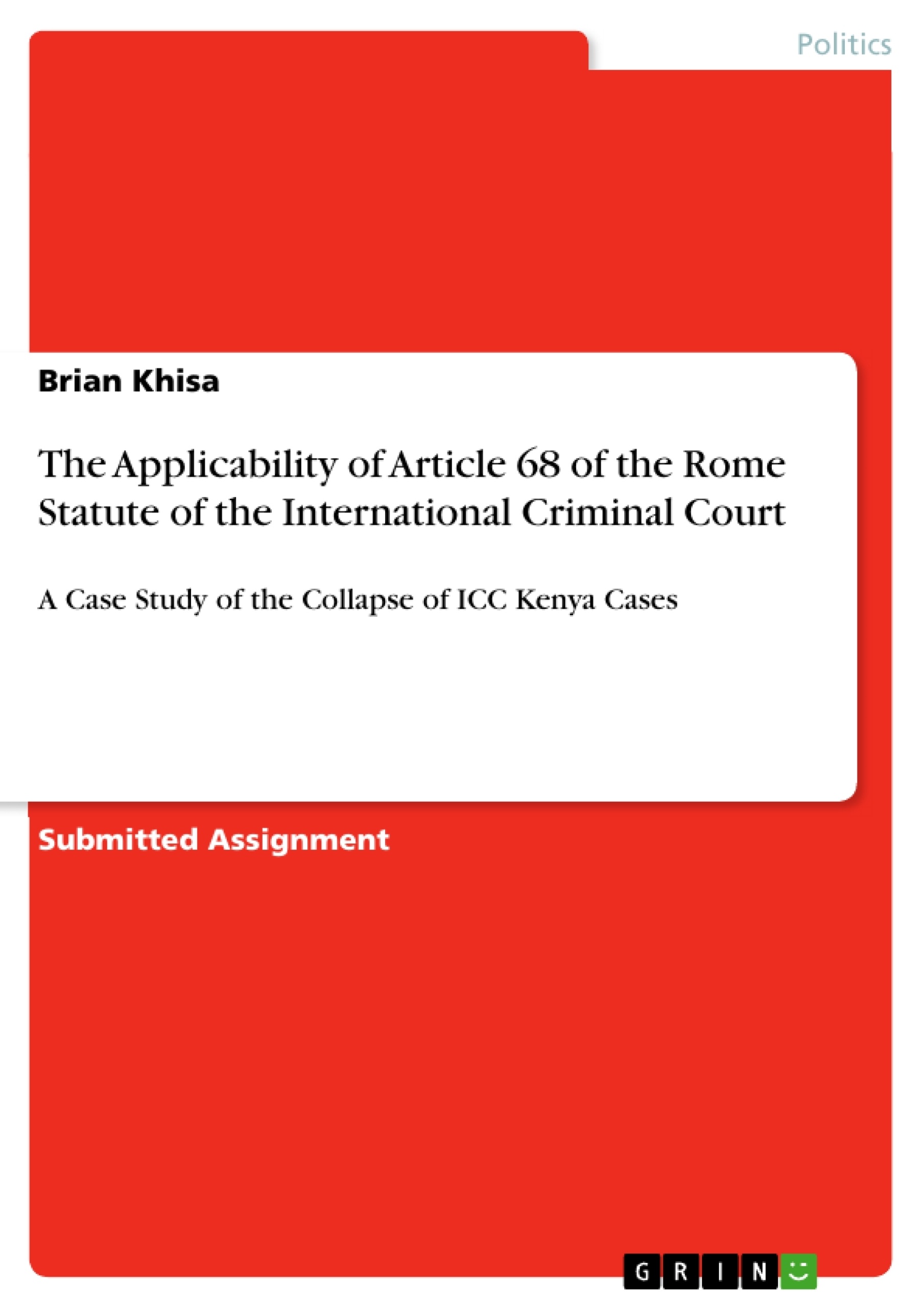This essay seeks to examine the impact and application of the Rome Statute of the International Criminal Court (ICC) with respect to Article 68, which places significant responsibility on the ICC to protect victims and witnesses. The essay relies on a case study of the collapse of the ICC Kenya cases against President Uhuru Kenyatta, Deputy President William Ruto and Joseph arap Sang, which were largely attributed to witness interference. The essay argues that while the successful trial of cases at the International Criminal Court relies heavily on the testimony of key witnesses, the Court’s lack of ability to ensure the safety of the witnesses in accordance with Article 68 of the Roman Statute, remains to be a matter of significant concern in the prosecution of core international crimes. The first part of the essay presents an outline of International Criminal Law from its origins to formation of the International Criminal Court. The essay then moves on to a critical examination of the Rome Statute, with an emphasis on the application of Article 68, based on the ICC framework and jurisprudence. This section emphasizes how crucial witnesses withdrew from the ICC Kenya cases, casting doubts on the Court’s capability to protect key witnesses. Before concluding, the final section addresses the International Criminal Court’s shortcomings in enforcing International Criminal Law through witness protection and makes recommendations.
Inhaltsverzeichnis (Table of Contents)
- 1.0 INTRODUCTION.
- 2.0 LITERATURE REVIEW ON INTERNATIONAL CRIMINAL LAW
- 2.1 EVOLUTION OF INTERNATIONAL CRIMINAL LAW.
- 2.1.1 Historical Origins of International Criminal Law in Public International Law.
- 2.1.2 Legacy of the Nuremberg and Tokyo Trials on International Criminal Law.
- 2.1.3 Contributions of the ICTY and the ICTR to International Criminal Law.
- 2.2 FORMATION OF THE INTERNATIONAL CRIMINAL COURT.
- 2.2.1 Rome Statute of the International Criminal Court.
- 2.2.2 The International Criminal Court (ICC).
- 2.3 FRAMEWORK OF THE INTERNATIONAL CRIMINAL COURT IN PROTECTION OF WITNESSES.
- 2.3.1 Legal Framework of the International Criminal Court to Protect Witnesses.
- 2.3.2 Institutional Framework of the International Criminal Court to Protect Witnesses.
- 2.3.3 Operational Framework of the International Criminal Court to Protect Witnesses.
- 3 APPLICABILITY OF ARTICLE 68 OF THE ROME STATUTE OF THE INTERNATIONAL CRIMINAL COURT: A CRITICAL ANALYSIS.
- 3.1 THE SIGNIFICANCE OF WITNESS TESTIMONY AT THE INTERNATIONAL CRIMINAL COURT.
- 3.2 APPLICABILITY OF ARTICLE 68 OF THE ROME STATUTE OF THE INTERNATIONAL CRIMINAL COURT.
- 3.3 COLLAPSE OF KENYA CASES AT THE INTERNATIONAL CRIMINAL COURT: A CASE STUDY.
- 3.3.1 Contextual Background to the 2007-2008 Post-Elections Violence in Kenya.
- 3.3.2 Intervention of the International Criminal Court to the Post-Elections Violence.
- 3.3.3 Implications of Witness Interference to Cases at the International Criminal Court.
- 4 RECOMMENDATIONS TO STRENGTHEN THE WITNESS PROTECTION FRAMEWORK OF THE INTERNATIONAL CRIMINAL COURT.
- 4.1 EFFICIENT WITNESS PROTECTION PROGRAM.
- 4.2 COORDINATION OF WITNESS PROTECTION ORGANS.
- 4.3 FLEXIBILITY IN WITNESS PROTECTION MEASURES.
- 4.4 RESOURCE-BACKED WITNESS PROTECTION AGENCY.
- 4.5 EFFECTIVE WITNESS PROTECTION ENFORCEMENT MECHANISM.
- 5 CONCLUSION.
Zielsetzung und Themenschwerpunkte (Objectives and Key Themes)
This essay aims to assess the impact and application of Article 68 of the Rome Statute, which focuses on the ICC's responsibility to protect victims and witnesses. Using the collapse of the ICC Kenya cases as a case study, the essay argues that the Court's inability to safeguard witnesses effectively poses a significant challenge to the prosecution of international crimes. Key themes explored in the essay include:- The evolution of international criminal law and the creation of the ICC.
- The critical role of witness testimony in international criminal trials.
- The effectiveness of Article 68 in protecting witnesses and its limitations.
- The impact of witness interference on the ICC's ability to prosecute cases.
- Recommendations for strengthening witness protection mechanisms at the ICC.
Zusammenfassung der Kapitel (Chapter Summaries)
- Chapter 1.0: Introduction outlines the historical context of international criminal law, highlighting the need for accountability mechanisms in the face of atrocities and human rights violations. The essay introduces its focus on Article 68 of the Rome Statute and the case study of the collapsed Kenya cases.
- Chapter 2.0: Literature Review on International Criminal Law traces the evolution of international criminal law from its historical origins to the establishment of the ICC. It examines the legacy of significant trials like Nuremberg and Tokyo, the contributions of the ICTY and ICTR, and the framework for witness protection within the ICC.
- Chapter 3: Applicability of Article 68 of the Rome Statute: A Critical Analysis discusses the importance of witness testimony in international criminal court proceedings. It analyzes the application of Article 68 in the context of the ICC Kenya cases, highlighting the challenges faced by the Court in protecting witnesses and the consequences of witness interference.
- Chapter 4: Recommendations to Strengthen the Witness Protection Framework provides recommendations to improve the ICC's witness protection mechanisms. These include the need for an efficient witness protection program, coordination between relevant organs, flexibility in protection measures, a resource-backed witness protection agency, and an effective enforcement mechanism.
Schlüsselwörter (Keywords)
This essay focuses on the International Criminal Court, the Rome Statute, Article 68, witness protection, witness interference, international criminal law, the Kenya cases, and accountability mechanisms. The key concepts explored include the evolution of international criminal law, the significance of witness testimony in international trials, and the challenges faced by the ICC in ensuring the safety of witnesses.- Quote paper
- Brian Khisa (Author), 2021, The Applicability of Article 68 of the Rome Statute of the International Criminal Court, Munich, GRIN Verlag, https://www.grin.com/document/1418819



